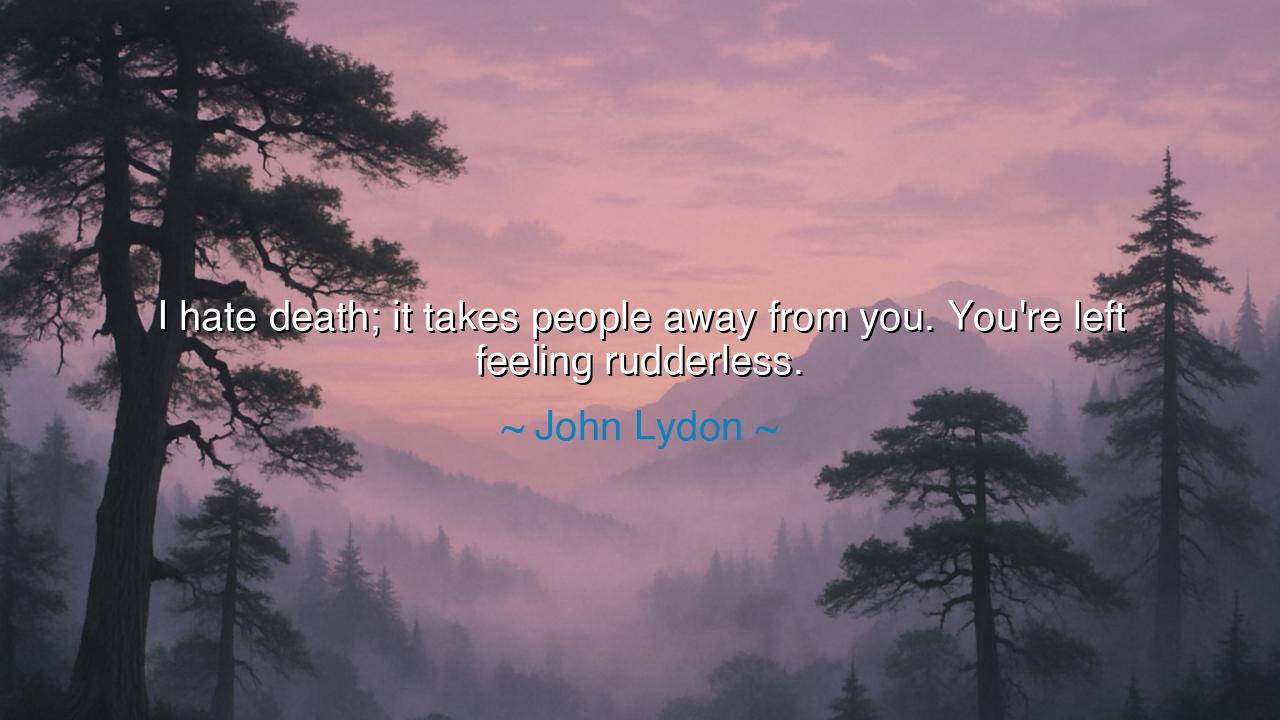
I hate death; it takes people away from you. You're left feeling






“I hate death; it takes people away from you. You're left feeling rudderless.” — thus spoke John Lydon, the voice once filled with rebellion and fire, now tempered by grief. In these words lies not only the lament of a man who has known loss, but the universal cry of the human heart when it faces the cold absence of those it loves. For death, though as old as time and as certain as dawn, still strikes the soul like lightning — sudden, searing, and final. It tears away the familiar stars that guide us through the night, leaving us, as Lydon says, rudderless, drifting in the vast, dark sea of mourning.
Lydon, known to the world as the fierce frontman of the Sex Pistols, was not a poet of softness. His words were sharp, his tone defiant, his spirit born in the fires of resistance. Yet even in this warrior’s heart, death left its wound. When he lost his wife, Nora Forster, after their long and tender marriage, the man who once shouted at the world with rage found himself whispering to it in sorrow. His confession — “I hate death” — is not blasphemy, but truth. It is the truth that even the strongest are powerless before the silence that follows the final breath.
The ancients too knew this anguish. When Achilles lost Patroclus, his brother in arms, he wept not as a warrior but as a man undone. His fury against Hector was not only vengeance, but rebellion against the cruelty of fate — against the same force that Lydon curses in his modern voice. Death, to the living, feels like theft. It steals the laughter that once filled a room, the voice that guided us, the eyes that made us feel seen. And when the beloved is gone, life itself feels unmoored, its compass shattered. To be rudderless is not merely to grieve, but to lose direction — for the ones we love are often the stars by which we steer our lives.
Yet in these words there is not only pain, but honesty, and in honesty there is power. Many fear to speak so plainly of death. They hide their sorrow behind silence, as if naming it might summon it again. But Lydon gives it voice, fierce and raw. By saying “I hate death,” he affirms love, for one can only hate death because one has loved deeply. Only those who have known the warmth of companionship feel the chill of loss. His hatred is not bitterness — it is love in mourning, the echo of affection refusing to be extinguished.
History offers us many such echoes. Consider Marcus Aurelius, emperor and philosopher, who buried his wife Faustina and several of his children, yet continued to rule with wisdom. In his Meditations, he wrote that all things are fleeting — that death is natural and must be accepted. Yet beneath his stoic words, we feel the ache of a man who had to remind himself daily that wisdom must triumph over despair. Lydon’s words, though far removed in time, are the same struggle of the heart against the inevitable: the war between acceptance and resistance, between the mind’s knowledge and the heart’s refusal.
But grief, though it casts us adrift, also teaches us something sacred. To be rudderless is to learn that no one truly steers life alone. The loss of another reveals how deeply our existence intertwines with theirs — how much of our own direction depends on their presence. Yet from this emptiness can come renewal. The ancient sailors, when caught in storms and stripped of their rudders, learned to navigate by the stars. So too must we, when loss strikes, lift our eyes to the heavens of memory and love. The dead cannot return, but their influence endures — in our words, our actions, our compassion.
And so, my child, let this be the lesson: do not fear to grieve, nor to hate death, for such feelings are the proof of your humanity. But do not remain rudderless forever. Honor those you have lost not by drifting, but by continuing the voyage they helped you begin. Let their memory guide your course. Speak their names often; live in a way that would make them proud. For though death may take the body, love endures beyond its reach, a compass eternal and unbroken.
As John Lydon reminds us, death steals — but it cannot destroy what love has built. The world may feel empty when a soul departs, but from that emptiness can rise strength, gratitude, and purpose. The heart that has known loss also knows the value of every fleeting moment. And in that knowledge lies the power not to be ruled by death, but to live — fiercely, truthfully, and fully — until the final tide calls us home.






AAdministratorAdministrator
Welcome, honored guests. Please leave a comment, we will respond soon